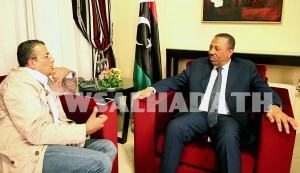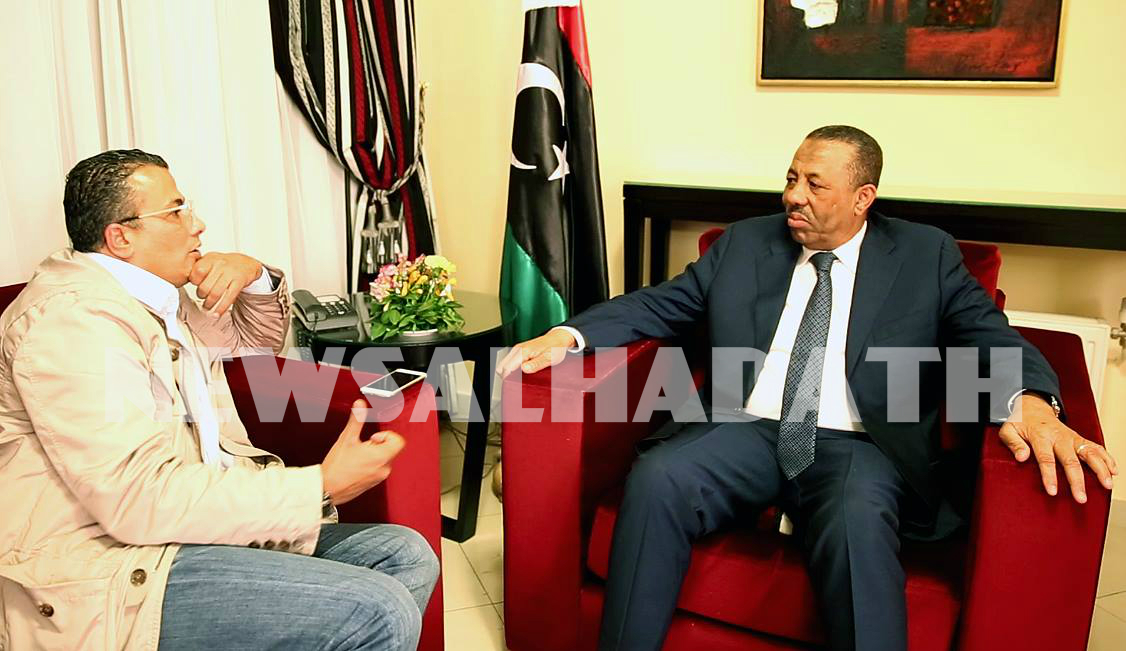By Libya Herald reporter.

Tunis, 31 March 2015:
The reasons for the weakness of the performance of the Libyan government are clear and . . .[restrict]everybody knows that I did not choose my ministers, admitted Prime Minister Abdullah Thinni.
They were forced upon me, he said, as part of a geographical distribution of portfolios by the House of Representatives (HoR).
Every Libyan region forced a name that represented it into my government. The government is also weak because of international pressure and the insistence of the opposition in the west on forming a counter government.
Thinni was speaking during a lengthy interview in Tunis with the Al-Hadath News website after his official visit to the Tunisian capital in which he held a wide range of meetings with .
Some of these Ministers forced upon me were good and are performing well, however, the majority are not up to standard, Thinni admitted candidly.
For example, Thinni continued, the Minister of Interior was appointed as a result of pressure and he represents the city of Misrata and he was nominated by former prime minister and head of the National Forces Alliance party Mahmoud Jibril.
The Minister of Interior Omar Sinki is not up to the job whatsoever, Thinni said emphatically and without any of the usual diplomatic speak. Sinki does not even have the basics for ministerial work, he added.
Thinni explained that he has known the Interior Minister on a personal basis since 1975 and that he is related to him. I know how to assess him and he has not added anything new to the police, Thinni said in a damning indigtment of the Interior Minister.
He has not even been able to find a headquarters for his Ministry in six months, complained Thinni.
It will be recalled that Prime Minister Thinni has suspended his Interior Minister and has refused to accept him back into office even after an HoR committee cleared him and the HoR ordered that he is to be reinstated to his post.
With regards to the relationship between his government and the HoR, Thinni said that most Representatives are up to the responsibility of their positions but others are not and are only concerned about personal gain.
This exists elsewhere in the world too in other parliaments and is not restricted to Libya, he added. There are no problems impeding the government’s work with the HoR, claimed Thinni.
He admitted that differences of points of view do however exist, but that the national interest forces them to work together. Thinni accepted that the HoR is the legislative body and that his government is obliged to execute its laws.
Thinni further explained that upon being asked to form a government, he had presented the HoR with 18 ministers in his proposed government, which he thought was a reasonable number. But the HoR insisted on reducing it to 10 portfolios.
‘‘Do you think that this (small) number (of Ministers) is capable of running a state’’, Thinni asked a rhetorical question which he answered himself. ‘‘Parliament (the HoR) must be responsible if it refused a (proposed) government with a clear vision and refused personalities (within it) such as Abdulhafid Ghoga (former memberof the NTC), Ashour Shwail (former Interior Minister) and Farida Allaghi (leading activist and currently Libya’s EU ambassador).
The HoR was only interested in the regional distribution of the portfolios. I refused Abdelmajid Mlegta after pressure by Mahmoud Jibril to appoint him as a Deputy Prime Minister as he was a controversial figure, explained Thinni. [/restrict]







